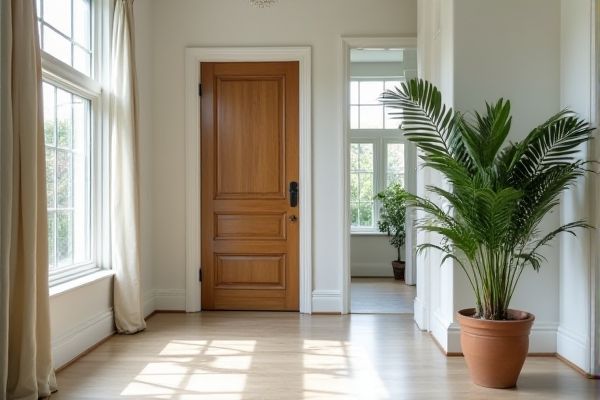
Choosing between a potted plant and an artificial plant in your entryway depends on factors such as maintenance, air quality, and aesthetic appeal, with potted plants offering natural freshness and air purification while artificial plants provide durability and zero upkeep. Explore the rest of the article to discover which option suits Your entryway best.
Table of Comparison
| Feature | Potted Plant | Artificial Plant |
|---|---|---|
| Appearance | Natural, vibrant, seasonal changes | Consistent look, no seasonal variation |
| Maintenance | Requires watering, pruning, sunlight | Low maintenance, occasional dusting |
| Air Quality | Improves air quality by filtering toxins | No air purification benefits |
| Durability | Can suffer from pests, diseases | Long-lasting, resistant to pests |
| Cost | Typically more affordable upfront | Higher initial cost but no ongoing care expenses |
| Environmental Impact | Biodegradable, eco-friendly if sourced responsibly | Made from plastics, less eco-friendly |
| Placement Suitability | Needs adequate light and humidity control | Suitable for any lighting and humidity condition |
| Allergen Potential | May cause allergies due to pollen | Generally hypoallergenic |
Introduction: Choosing Plants for Your Entryway
Selecting the right plants for your entryway enhances curb appeal and sets a welcoming tone. Potted plants offer natural air purification and seasonal variety, while artificial plants require minimal maintenance and retain a vibrant look year-round. Assess lighting conditions, care commitment, and style preferences to decide between living greenery and durable faux alternatives.
Aesthetic Appeal: Real vs. Artificial Plants
Real potted plants in your entryway offer vibrant colors, natural textures, and seasonal changes that enhance the overall aesthetic appeal with authenticity. Artificial plants provide consistent greenery without maintenance, retaining their perfect appearance year-round but may lack the dynamic beauty and scent of living plants. Choosing between them depends on your preference for natural ambiance versus convenience and long-term visual consistency.
Maintenance Requirements: Potted Plants vs. Artificial Options
Potted plants in an entryway require regular watering, sunlight, and occasional pruning to stay healthy, making them a low-maintenance yet rewarding choice for natural ambiance. Artificial plants eliminate the need for watering and sunlight, requiring only occasional dusting to maintain their appearance, offering a hassle-free option for busy households. Your decision between potted and artificial plants depends on how much time you're willing to invest in upkeep versus your desired level of realism.
Air Quality Benefits of Live Entryway Plants
Live potted plants in an entryway actively improve indoor air quality by filtering out pollutants such as formaldehyde, benzene, and carbon monoxide, which artificial plants cannot do. Their natural processes increase oxygen levels and humidity, creating a fresher and healthier environment compared to static artificial counterparts. Incorporating species like spider plants, snake plants, or peace lilies optimizes air-purifying benefits, making live plants superior for enhancing entryway air quality.
Longevity and Durability: Comparing Plant Types
Potted plants offer natural beauty and air-purifying benefits but require regular care, making their longevity dependent on consistent watering and light conditions. Artificial plants provide unmatched durability and maintain a fresh appearance without maintenance, lasting years regardless of environmental factors. You can choose artificial plants for long-term aesthetic appeal or potted plants to enjoy authentic greenery with ongoing attention.
Cost Analysis: Upfront vs. Long-Term Investment
Potted plants typically require a higher upfront cost for quality soil, pots, and healthy plants, but they offer long-term benefits such as air purification and natural growth. Artificial plants have a lower initial investment and require minimal maintenance, but they may incur replacement costs over time due to fading or damage. Evaluating the total cost of ownership reveals potted plants as a sustainable investment, while artificial plants cater to budget-conscious buyers prioritizing low upkeep.
Placement Flexibility: Light Needs and Limitations
Potted plants in entryways require strategic placement near natural light sources like windows or skylights to thrive, limiting flexibility in dim or windowless spaces. Artificial plants offer greater placement flexibility as they do not depend on light conditions, allowing for decorative use in any entryway environment regardless of illumination. Choosing between the two depends on balancing the desire for natural plant benefits against the need for versatile positioning in varied lighting situations.
Seasonal Decor Adaptability in Entryways
Potted plants offer dynamic seasonal decor adaptability in entryways with their natural growth cycles, allowing you to switch varieties and foliage to match the time of year. Artificial plants provide consistent greenery year-round without maintenance but may lack seasonal authenticity and the ability to showcase evolving textures or colors. Choosing potted plants enhances the entryway's seasonal ambiance and freshness, while artificial options prioritize low effort and lasting appearance.
Environmental Impact: Sustainability Considerations
Potted plants in entryways contribute positively to sustainability by improving air quality and supporting indoor ecosystems, while also being biodegradable and renewable. Artificial plants, often made from non-biodegradable plastics and synthetic materials, pose environmental challenges due to their production processes and difficulty in disposal. Choosing a potted plant for your entryway aligns with eco-friendly practices and reduces your environmental footprint.
Final Verdict: Best Plant Choice for Your Entryway
Potted plants in entryways provide natural air purification and a refreshing aesthetic that enhances wellness and ambiance, making them ideal for those prioritizing health and authenticity. Artificial plants offer low maintenance, consistent appearance, and allergen-free benefits, perfect for busy households or spaces lacking natural light. For a balance of beauty and practicality, potted plants remain the best choice when environmental quality and natural charm are desired, while artificial plants suit environments requiring durability and minimal upkeep.
 homyna.com
homyna.com